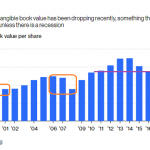The Federal Reserve should raise interest rates, because inflationary pressures are greater than most policymakers admit and the economy is nearing full employment.
Seniors won’t get a boost in their social security checks this year because consumer prices for urban wage earners—the measure the government uses to adjust those payments—fell from the third quarter of 2014 to 2015. However, that’s largely because oil fell from over $100 a barrel to less than $50, pulling down retail prices for gasoline, home heating oil and related commodities.
Remove energy prices, and the broader, the all urban Consumer Price Index commonly used to measure inflation is up nearly 1.9 percent.
As domestic oil and natural gas production fall, energy prices will rebound. That will push up costs for airlines, supermarkets and many other businesses that must be passed on to consumers.
An increase of just $10 a barrel would likely boost any measure of inflation government number crunchers could devise above the Fed’s 2 percent target for price stability.
Even with turmoil in China and retrenchment in the oil sector, U.S. GDP growth is expected to exceed 2.5 percent going forward. That’s significantly better than the first six years of the recovery, because consumer spending, which accounts for nearly 70 percent of the economy, is advancing at about a 3.5 percent annual pace.
Household balance sheets are in great shape, thanks in part to the recovery in housing and stock prices and a sustained period of consumer led growth seems likely. That will boost tax revenues and federal and state government spending, and further accelerate growth.
Job openings are near their highest level since the recovery began but hiring has slipped a bit, because employers can’t find workers with the right skills, and wages are likely to rise more rapidly. For example, Wal-Mart’s plan to pay workers more is shifting more of the retail behemoth’s profits to its employees.











Leave A Comment